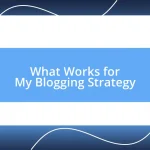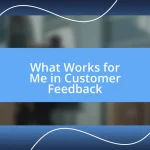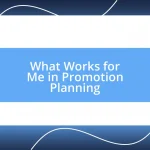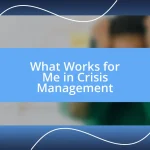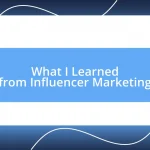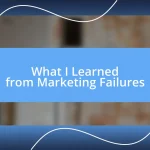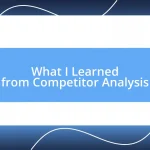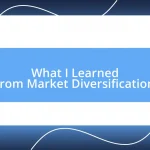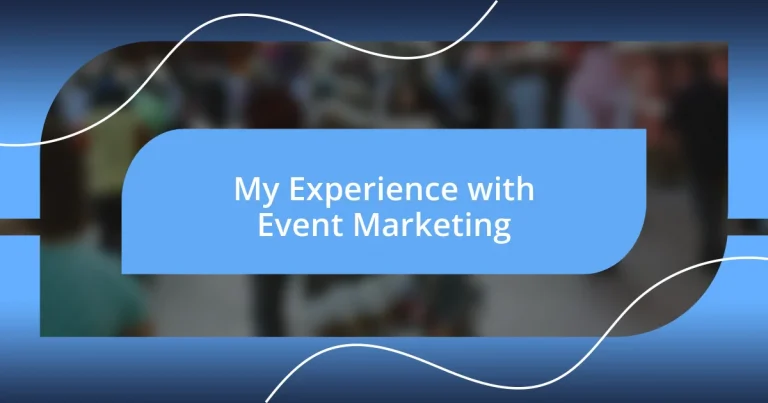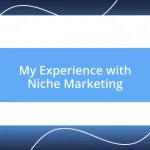Key takeaways:
- Understanding your audience and implementing engaging strategies enhances the event experience and fosters genuine connections.
- Leveraging social media effectively promotes events and maintains attendee engagement, creating a sense of community and excitement.
- Measuring success goes beyond attendance figures; gathering qualitative feedback and setting specific goals are vital for continuous improvement and future planning.
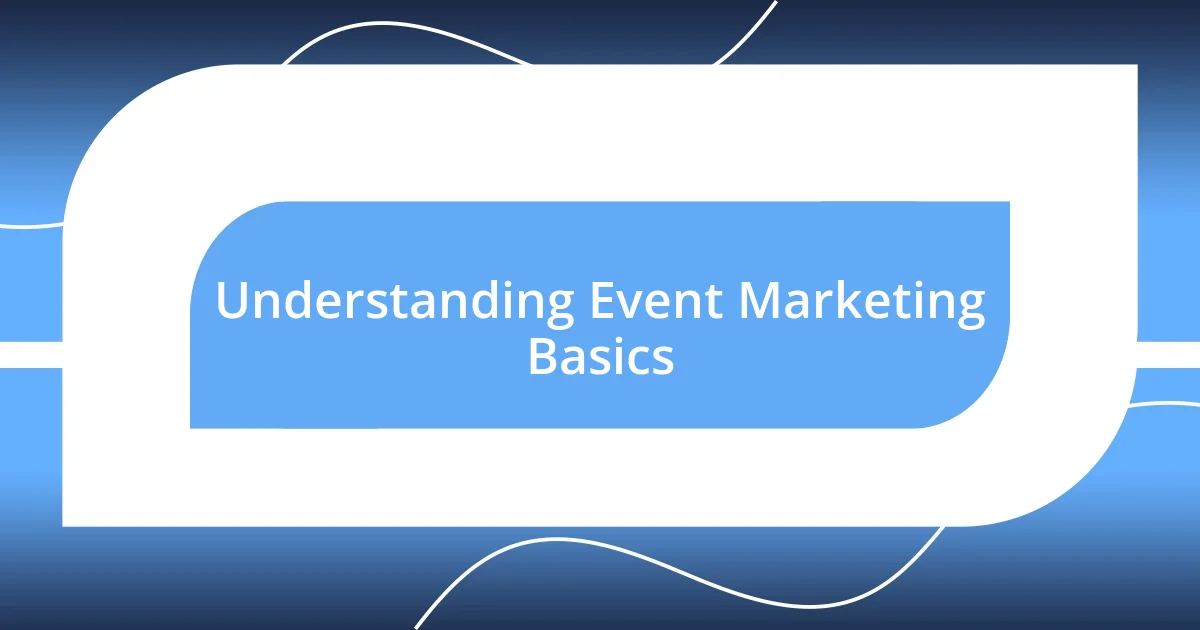
Understanding Event Marketing Basics
Event marketing is all about creating memorable experiences that resonate with your audience. I remember my first event where we branded every detail to align with our message. The attendees’ smiles and genuine engagement told me everything; they felt part of something special, and that connection is what effective event marketing strives for.
Understanding your audience is crucial in event marketing. Reflecting on my experiences, I’ve often found that the best events happen when the content mirrors the interests of the participants. Have you ever noticed how some gatherings feel flat? It’s usually because the organizers missed the mark on truly knowing who they were targeting.
Moreover, successful event marketing combines strategy with creativity. I once worked on an event where we incorporated interactive elements, turning a standard presentation into a lively discussion. This not only increased participation but also built a community atmosphere. How do you think your events could benefit from blending strategic planning with innovative ideas?
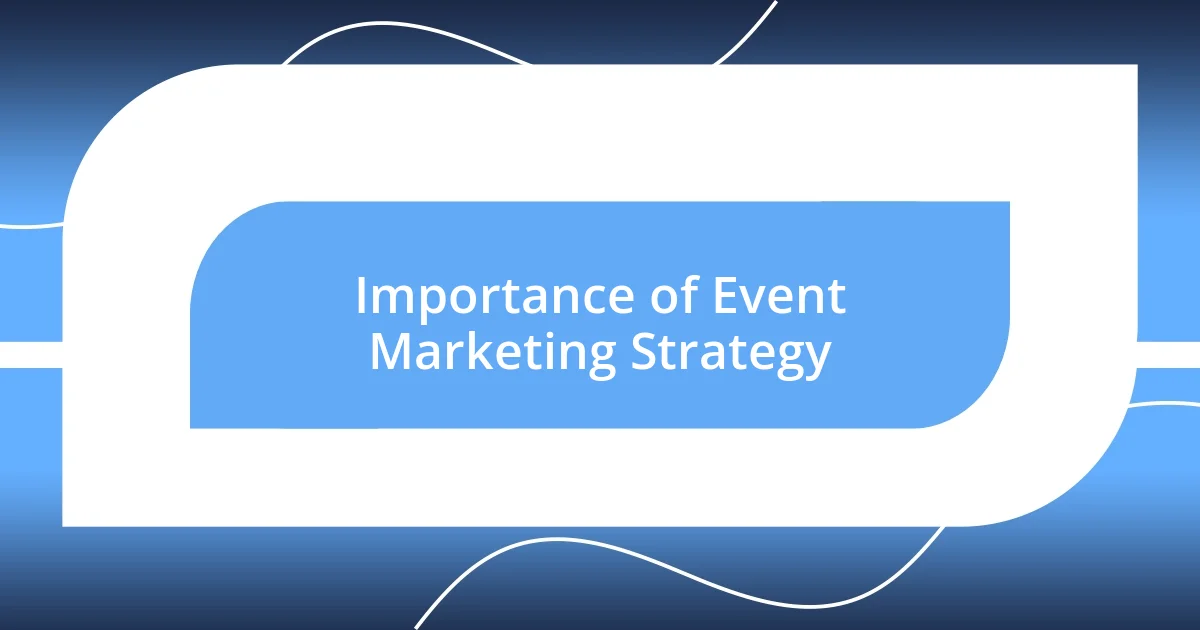
Importance of Event Marketing Strategy
The effectiveness of an event marketing strategy cannot be overstated. From my experience, a well-structured strategy not only attracts the right audience but also enhances their overall experience. For instance, I once organized a tech conference that featured tailored breakout sessions based on attendee preferences. The result? Participants left not just informed, but excited, creating lasting connections—an outcome every marketer dreams of!
Audience engagement is at the heart of any event marketing strategy. I’ve learned that when you actively involve attendees, they become more than just spectators—they transform into advocates for your brand. I remember an event where we set up a live polling system during a keynote. Attendees loved sharing their thoughts in real-time, and the energy in the room felt electric. That level of interaction made the event unforgettable for everyone involved.
Furthermore, measurable outcomes are vital. One time, we implemented a feedback loop right after an event, collecting insights through surveys. This strategy allowed us to assess what worked and what didn’t, leading to improvements in subsequent gatherings. Knowing that our approach was evolving based on direct feedback provided both comfort and motivation as we planned further events.
| Key Element | Impact on Events |
|---|---|
| Engaging Strategies | Enhances Audience Interaction |
| Target Audience Understanding | Increases Relevance and Connection |
| Measurable Outcomes | Allows for Continuous Improvement |
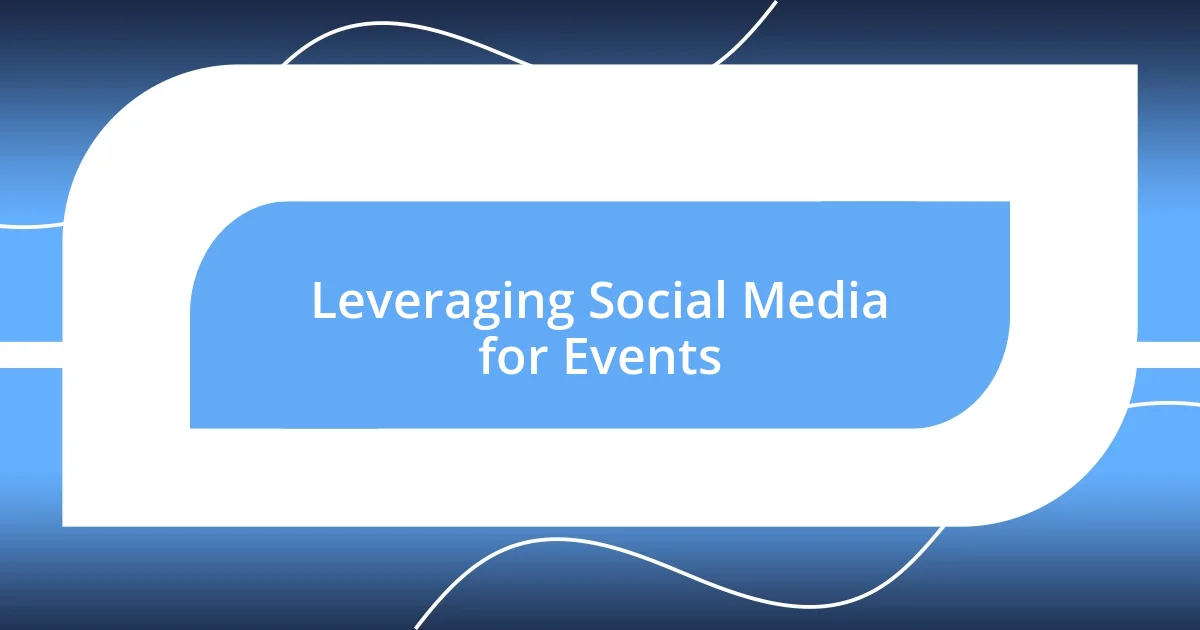
Leveraging Social Media for Events
Social media has become an indispensable tool for promoting events. In my experience, using platforms like Instagram and Twitter not only broadened our reach but also fostered excitement leading up to the event. I recall a time when we hosted a music festival and created a unique hashtag. Attendees started sharing their favorite memories and moments during the event, which generated a wonderful buzz that carried over long after it ended.
Here are some strategies that worked well for us:
- Create a Unique Event Hashtag: Encourage attendees to use it when posting, creating a sense of community.
- Run Countdown Posts: Build anticipation by sharing behind-the-scenes content leading up to the event.
- Engage with Attendees Online: Respond to comments and questions to create a conversation and deepen connections.
- Leverage Live Streaming: Offer sneak peeks or live updates for those who cannot attend, expanding your audience reach.
Each of these tactics, from crafting engaging posts to interacting with the community, helped us not just draw a crowd but forge meaningful relationships. My heart still swells with pride when I think about those shared moments. They turned our event into a collective experience rather than just an isolated occasion.
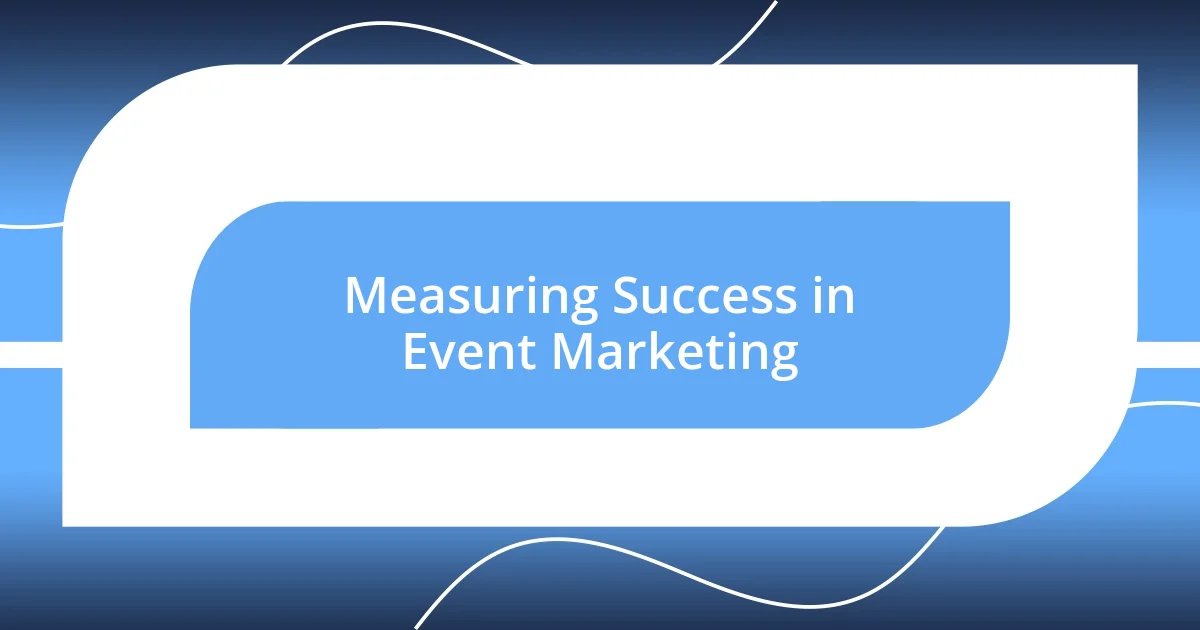
Measuring Success in Event Marketing
When it comes to measuring success in event marketing, I believe in looking beyond traditional metrics. Sure, attendance numbers are important, but I’ve found that delving into attendee feedback provides a goldmine of insights. After one particularly memorable networking event, I asked participants to share their key takeaways in a brief survey. Their enthusiasm and detailed responses revealed not only what resonated with them but also sparked ideas for future events. It was a reminder that qualitative data often tells the story behind the numbers.
I remember launching a post-event analysis that included social media engagement metrics. We monitored likes, shares, and comments around the event, leading to some fascinating discoveries. One session saw a wave of online interactions, which told me that it was not just the content but the speakers’ charisma that struck a chord with attendees. Isn’t it incredible how a single conversation can elevate an event’s profile? Real-time insights like this can steer decision-making as we plan our next steps.
Lastly, I find it crucial to set specific goals before an event and measure progress against them. For instance, during a charity function, we aimed to raise a certain dollar amount and also grow our mailing list. Post-event, I felt a profound sense of accomplishment when we not only met but exceeded those targets. Reflecting on these success measures reinforces the idea that every event is another opportunity for growth—not just for our brand but also for myself as a marketer. How do you define success in your events? It’s a question worth pondering while tracking results.
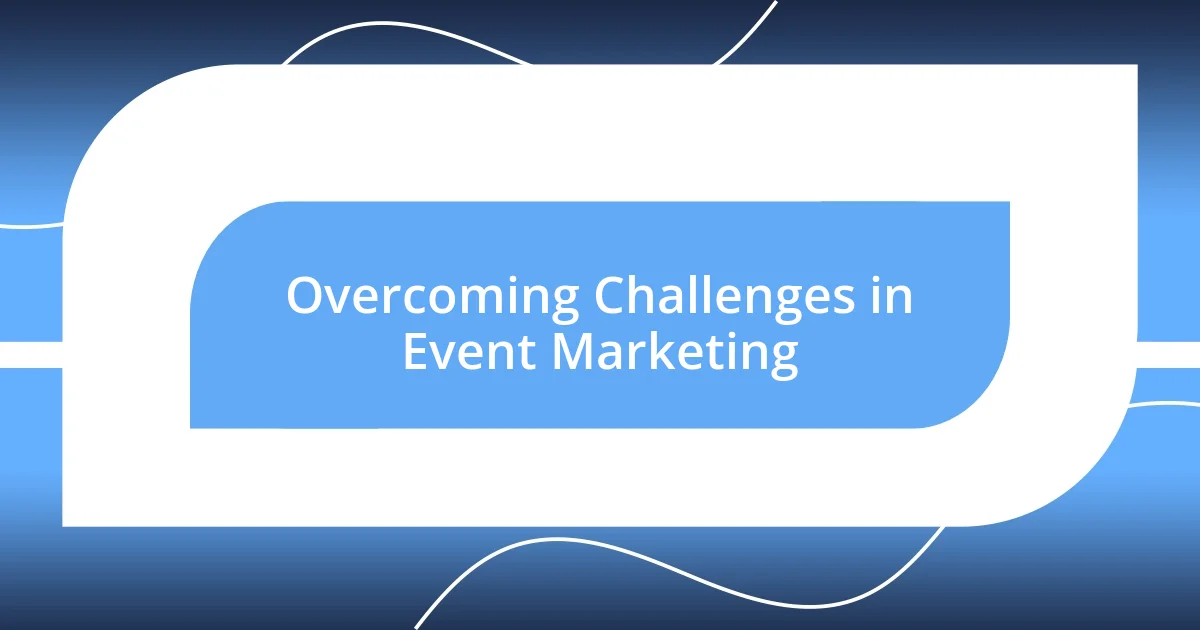
Overcoming Challenges in Event Marketing
Managing challenges in event marketing requires flexibility and creativity. I remember a particular event where we faced a last-minute venue change due to unforeseen circumstances. Instead of panicking, our team quickly rallied together, contacting local venues and securing a new spot that, while different, had its own unique charm. This experience taught me that adaptability can transform potential disasters into unexpected opportunities. Have you ever had to pivot in a way that turned out better than you planned?
Another challenge I’ve encountered is budget constraints, which can feel overwhelming at times. In one instance, I was determined to host an outdoor community fair with limited funds. Instead of viewing this as a setback, I brainstormed ways to leverage local partnerships and crowd-funding. We reached out to nearby businesses for sponsorship and collaborated with local artists who were eager to showcase their talents. This not only enriched the event but also strengthened community ties. Have you explored similar collaborations in your projects?
Lastly, keeping attendees engaged during the event can pose its own set of difficulties. During a corporate retreat, I noticed that some attendees seemed disconnected during presentations. To combat this, I introduced interactive activities, such as breakout discussions and real-time polling. The energy in the room shifted dramatically. It reminded me of the importance of fostering engagement; after all, who wouldn’t want their audience to feel involved? What techniques have you found effective in creating lasting involvement?
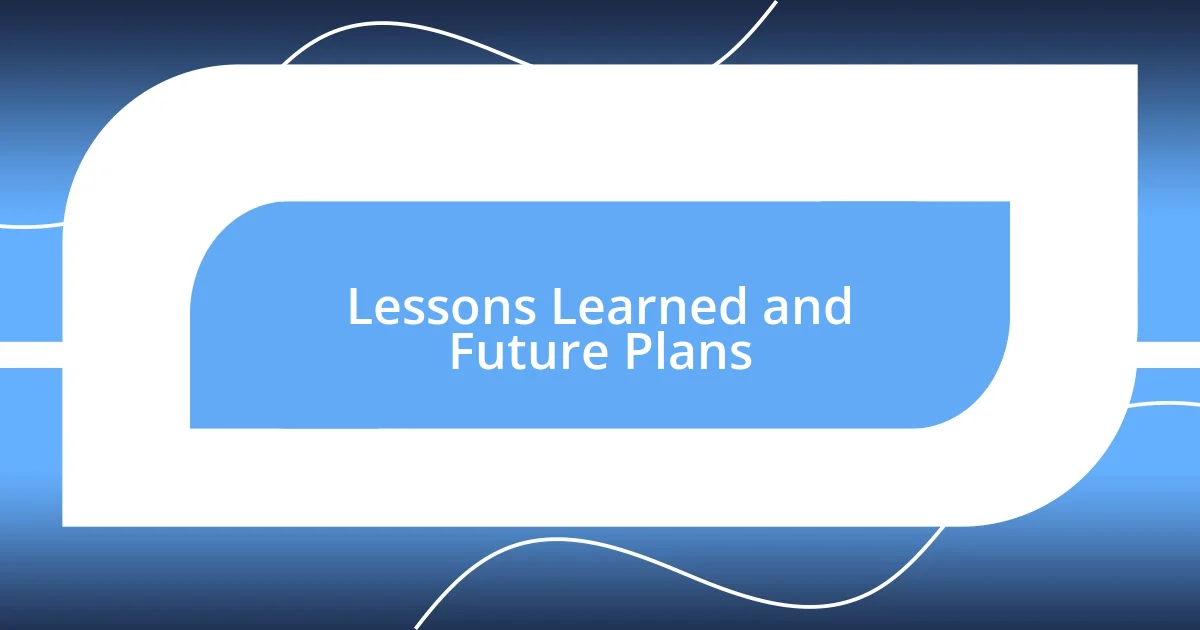
Lessons Learned and Future Plans
Reflecting on my journey through event marketing, I’ve learned that resilience is key. There was an instance when my meticulous planning met a sudden storm that threatened our outdoor gathering. Feeling a mix of panic and determination, I quickly organized an indoor alternative. Surprisingly, this shift led to more intimate interactions among attendees, deepening connections. It really highlighted for me how unexpected challenges can lead to unanticipated successes. Have you experienced a similar twist in your plans?
Looking ahead, I’m eager to focus on more immersive experiences. I recently attended a virtual conference that used gamification elements, making the event memorable and engaging. I’m inspired to incorporate similar strategies into my future events, blending technology with personal touches to create richer experiences. It’s an exciting prospect, but it raised a question for me: how can we leverage new trends while ensuring that the core messaging remains genuine and impactful?
I also want to emphasize building stronger community ties moving forward. During one event, I witnessed firsthand the joy that local partnerships brought, not just to the attendees but also to the businesses involved. It was heartwarming to see small vendors thriving while making our event more vibrant. I realize now that fostering these relationships isn’t just beneficial for an event’s success but also for creating a sense of belonging. How do you envision engaging with your community in the events you plan?
